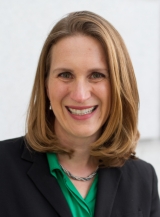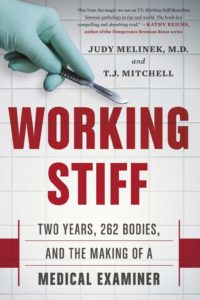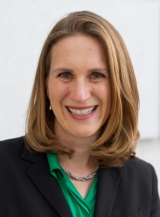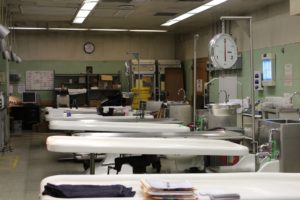Today, SevenPonds speaks with Judy Melinek, M.D., a forensic pathologist who does autopsies for the Alameda County Sheriff Coroner’s Office in California. Dr. Melinek has a bachelor’s degree from Harvard and medical degree from the University of California, Los Angeles. She is also the author of a New York Times bestselling memoir, “Working Stiff: 262 Bodies and the Making of a Medical Examiner,” which was co-authored with her husband, T.J. Mitchell, and the CEO of Pathology Expert Inc.

Credit: pathologyexpert.com
Debra: Judy, thank you so much for answering these questions. I know your responses will help families learn a little more about medical examiners and how to deal with them. So, first of all, what does a medical examiner do?
Judy: A forensic pathologist is a doctor who investigates cases of sudden, unexpected or violent death. Sometimes the forensic pathologist is in charge of the case investigation system in a particular county; that person is called a medical examiner. Sometimes the forensic pathologist works for the coroner’s office, an administrative office run by a county official – sometimes the sheriff. In all cases, the forensic pathologist performs the autopsies, but the way the office is structured – whether medical examiner or coroner – defines how the rest of death investigation is conducted.
Debra: When is a death referred to a medical examiner?
Judy: Deaths are referred to the medical examiner or coroner when the death is sudden, violent, or unexpected. State law defines which cases these are. The reports are most frequently made by 911 dispatch, paramedics, or hospital staff when the death is pronounced.
Debra: What can a family expect when a medical examiner becomes involved?
Judy: Families can expect that the body may be brought to the medical examiner’s or coroner’s office for an autopsy, and that the decision about whether an autopsy will be performed will be based on the information received from medical records or law enforcement agencies. The family needs to cooperate with the questions raised by the coroner’s investigator or pathologist. They should be forthcoming with medical history, including drug or alcohol use history, because withholding the information may delay or  confound the determination of the cause of death.
confound the determination of the cause of death.
Debra: How do families typically react when the medical examiner becomes involved?
Judy: There is no “typical” reaction. Reactions can span from apathetic to seriously involved in the investigation, either by being helpful or obstructionist. Some families object to an autopsy on religious grounds. Sometimes family members are wary of talking to coroner’s investigators, especially if the death was the result of a criminal act or substance abuse. There are also family members who try to cover up evidence of a suicide because of insurance benefits, social stigma, or religious beliefs. When someone – anyone – interferes with a death investigation, it slows down the process and makes things more difficult for the investigators, the police and, ultimately, the family. But most often, it’s been my experience that family members are grateful that we are trying to figure out what happened and give them answers. I have had family members of the dead loved ones send me Christmas cards and birth announcements many years after a case was resolved.

Credit: Pathologyexpert.com
Debra: How do you deal with family members who object to an autopsy based on religious or cultural beliefs?
Judy: State law defines whether a coroner or medical examiner is required to consider a religious exemption request. In general, we try to honor these beliefs as long as they don’t interfere with a criminal investigation. If the death appears natural and there is no evidence of foul play, then in some cases we won’t insist on performing an autopsy over the family’s objections; though in these cases, we may have no choice but to certify the cause of death as undetermined, which can complicate inheritance or insurance payments.
Debra: How do you handle cases where the dead loved one needs to be viewed for identification?
Judy: Visual identification of deceased loved ones is usually done at the scene, but if it cannot be done at the scene, then generally we don’t ask families to come to the morgue to identify the loved one. In my training, we would show photographs to the family in cases where a visual identification was needed. But in most cases we try to identify the body using reliable scientific means such as fingerprints or dental x-rays. In cases where the loved one does not have prior fingerprint or radiographic records, then the family may be contacted for exemplars that can be used in DNA analysis.
Debra: What can you do to make the medical examiner experience easier for the family?
Judy: I am bound to do a thorough and complete job in a timely fashion, and I take that responsibility seriously. Many families want answers right away, but sometimes workload or the individual characteristics of a complex case make it difficult to be speedy. I resolve most of my cases in about a month, but there have been several that have taken me over a year. In some of these, we couldn’t track down medical records. In others, our office was waiting for other agency reports or advanced laboratory testing in order to help us determine the cause or manner of death. In all cases that take longer, I try to keep in touch with the family and keep them appraised of my findings with an explanation about what I am doing and what I am waiting for.

Credit: sfearthquakesafety.org
Debra: How does an autopsy affect the funeral?
Judy: In most cases an autopsy examination should not affect the funeral other than to delay it by a day or two. If the family is Jewish or Muslim and needs the autopsy to be expedited in order to meet a requirement for a speedy funeral, they ought to inform the coroner or medical examiner and arrangements can be made to accommodate them. An open or closed casket depends more on the condition of the dead loved one prior to the autopsy. Penetrating facial trauma and decomposition are the most common reasons why a family might opt for a closed casket. These decisions are often made in consultation with the mortician or funeral home staff.
Debra: Judy, I’d like to thank you for your time and your thoughtful answers.
Judy: You’re welcome, Debra.

 How Can a Family Best Work with a Coroner or Medical Examiner? Interview with Judy Melinek
How Can a Family Best Work with a Coroner or Medical Examiner? Interview with Judy Melinek


 “As Tears Go By” by Marianne Faithfull
“As Tears Go By” by Marianne Faithfull

 Funeral Favors Offer Visitors a Tangible Memento
Funeral Favors Offer Visitors a Tangible Memento















